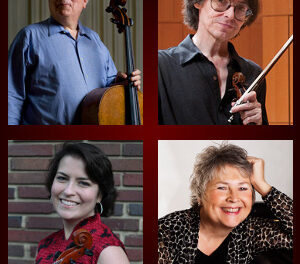Cantari is a 26 voice auditioned ensemble chosen from the community chorus, Voices, under the direction of Dr. Sue T. Klausmeyer. The program for this concert, presented at Holy Trinity Lutheran Church, was entitled “Sing Joyfully!” and featured selections by two English renaissance composers and two motets by J.S. Bach.
The concert opened with the anthem “Sing Joyfully” by William Byrd (1540-1623). This anthem for unaccompanied six-part choir, a setting of text from Psalm 81:1-4, displays Byrd’s mastery of renaissance polyphony. The singing was superb, with crisp, clear enunciation, precise entrances, and marvelous blending of all voices with key parts shining through when called for. The worship space of Holy Trinity provided an ideal chamber for renaissance polyphony, and Cantari provided an ideal performance.
Next we heard three anthems from the pen of Orlando Gibbons (1583-1625): “Magnificat,” from the Second Service, “Lift Up Your Heads,” and “Almighty and Everlasting God.” Gibbons was a highly regarded organist, choir master, and composer who died rather suddenly at the age of 41. Several of his anthems and keyboard works are frequently performed yet today. His madrigal, “The Silver Swan,” remains a favorite as well.
These anthems show vivid musical ideas with colorful examples of word-painting and imaginative vocal scoring. They are all in English, including the “Magnificat,” and were sung with marvelous warmth and inspiration by this accomplished and well-trained choir.
Returning to Byrd, we heard “Haec Dies” (“This is the day which the Lord has made”). Byrd was a devout Catholic, and his three masses (for 3-, 4-, and 5-voice choirs) are acclaimed masterpieces. He also composed anthems for Anglican worship, as the one that opened this program. The six-part Latin motet, “Haec Dies,” was sung in both Catholic and Anglican settings.
Johann Sebastian Bach (1685-1750) wrote six motets that are assuredly his; others attributed to him are spurious. The renaissance motet was by definition a polyphonic a cappella musical setting of Latin text, usually sacred and not connected to the liturgy of any specific day. Bach’s motets differ in that they are in German and accompanied by basso continuo; in this instance the organist was Andrew Pester. Lisa Ferebee played cello and Allison Portnow played bass.
Bach’s motets are longer and more developed than the typical renaissance motet. They are characterized by extraordinary counterpoint, passages demanding superior vocal technique, expectation of an impressive variety of voicing and refined vocal texture plus exquisite text painting.
Cantari sang two of these marvelous motets. The four-part Lobet den Herrn, allen Heiden (“Praise the Lord, all you heathen”), S.230, draws its text from Psalm 117:1-2. The date and occasion of its composition are uncertain. The thrilling double choir (eight-voice) Singet dem Herr ein neues Lied (“Sing to the Lord a new song”), S.225, draws on two different Psalm passages and a Lutheran hymn for its text. There are many stunning aspects in this work: the imaginative and highly effective use of the double choir, the crisp melismatic phrases that cut through homophonic passages, variety of meter and texture, and dazzling fugues.
These motets are always among the most challenging music a choir can undertake, and Cantari lived up to the challenges in all respects. The ensemble’s performance projected the singers’ pleasure in the music, and the results were glorious. To put it another way, they lived out the title of the concert; “Sing Joyfully!”
Between the two Bach motets we heard one of the keyboard compositions by Byrd, his Fantasia in D. It was performed by Pester on the Casavant Opus 3705 organ at Holy Trinity and was a masterful display of his keyboard artistry.











